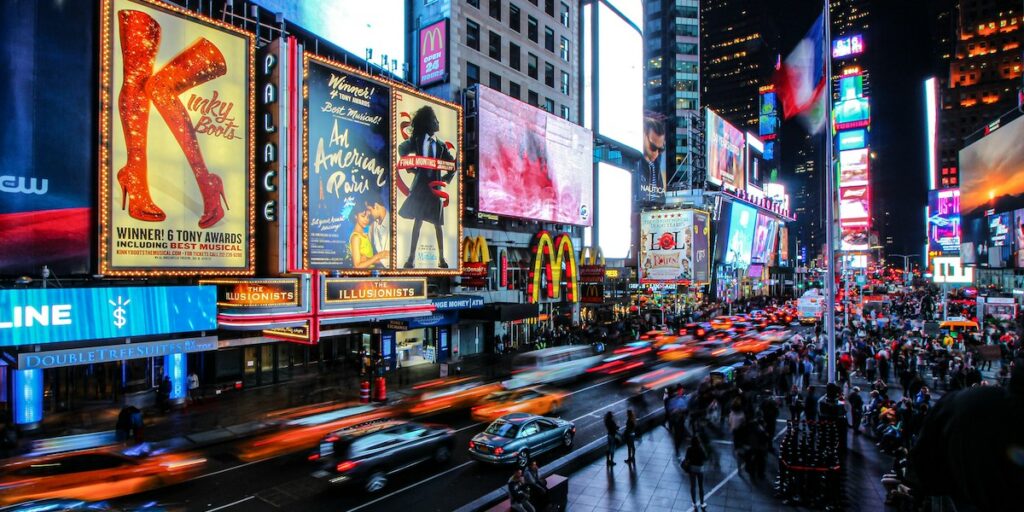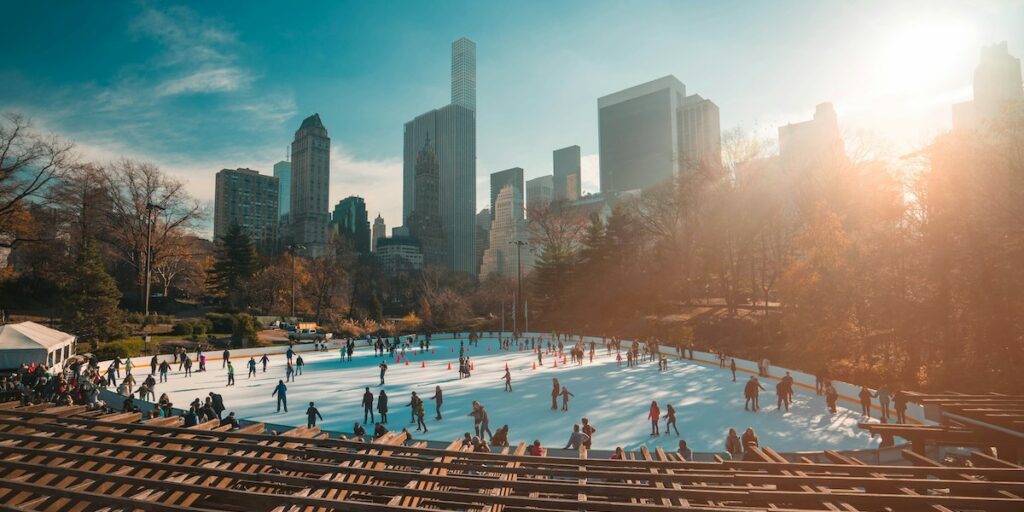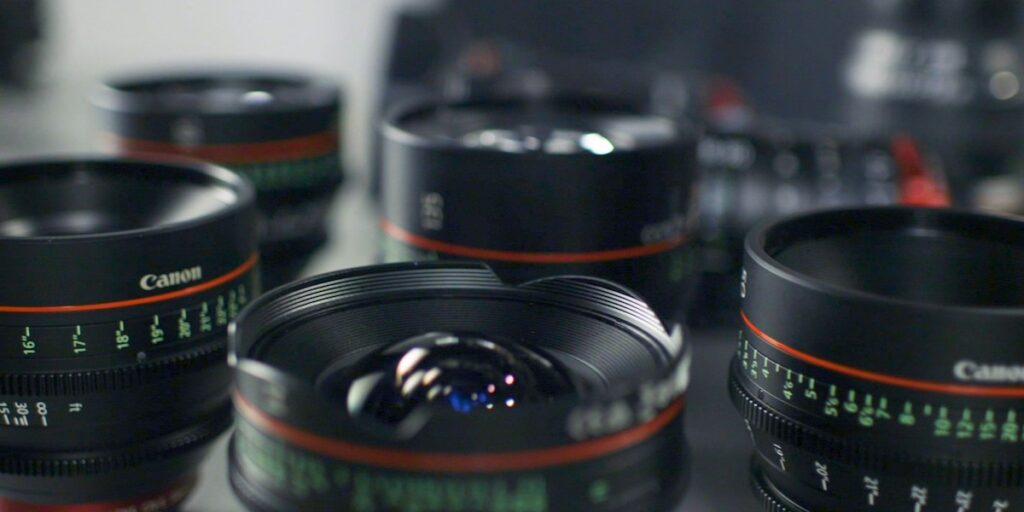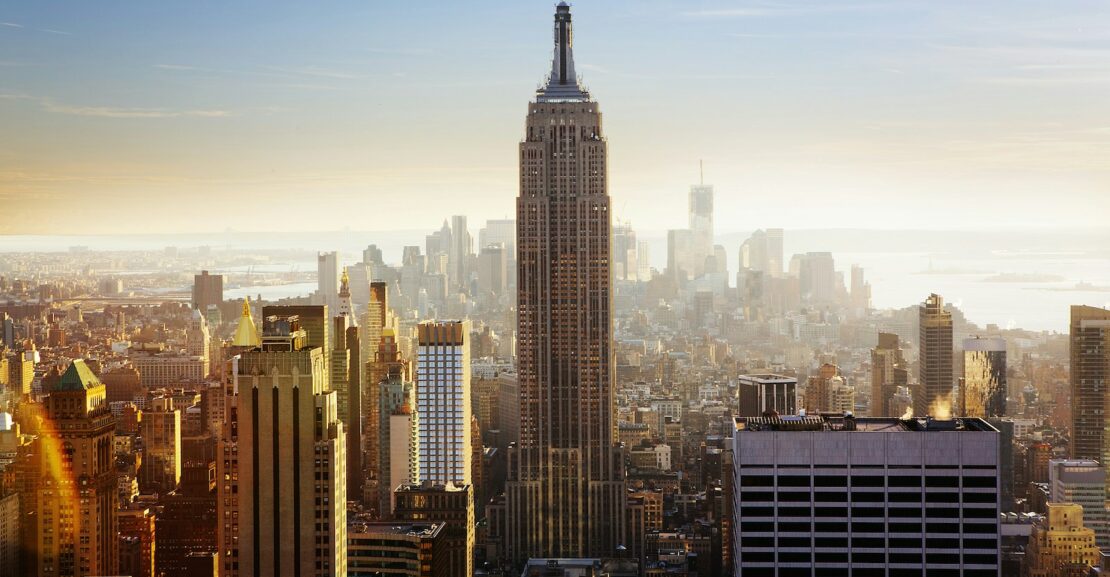Few cities hold such an iconic place in movie history as New York. From The Godfather and Annie Hall to Spider-Man and John Wick, the Big Apple has featured in countless movies and TV shows over the years, with its busy streets and iconic landmarks serving as main characters in their own right. L.A. might have the filmmaking infrastructure, but New York has the scenery and beating heart that make it a filmmaker’s mecca.
If you’re filming in NYC, there are a few things you need to know before getting started. Specifically, you’ll need to know about insurance requirements, obtaining permits, location scouting, where to rent cameras, and how to go about hiring cast and crew. This guide to filming in NYC will help you navigate the labyrinth of rules and regulations, provide tips on how to tap into the city’s vibrant filmmaking network, and detail some of the state-funded incentives that could take that ever-dwindling budget off life support.
Whether you’re in pre-production or pushing your way through the final stages of a project, Camera Rentals NYC offers expert guidance and top-notch equipment rentals, ensuring you have everything you need to bring your vision to life. As working filmmakers, we not only provide the hardware you need to get your project off the ground, but also the experience to help you navigate the complexities that inevitably arise while filming in the city.
Insurance (where it all begins)
Most films begin with a spark of inspiration and a well-crafted script, but when it comes to the actual filming process, it all starts with the decidedly unglamorous world of insurance. Before you can apply for a permit from the Mayor’s Office of Media and Entertainment (MOME), you need to have commercial general liability (CGL) insurance. The full list of requirements and a list of brokers can be found here, but the main thing to note is that the policy must cover at least $1,000,000 per occurrence.
The MOME may also require additional insurance depending on the nature of the shoot, and many property management companies for the buildings you film in require separate insurance. In many cases, you and your crew won’t even be able to make it through the freight entrance of a given property without providing paperwork proving that you have a policy that matches the requirements for the location.
Filming in NYC DraftIf you are renting equipment, you will likely need to insure it as well. At Camera Rentals NYC, we offer maximum flexibility. If you have an existing policy, you can submit the Certificate of Insurance (COI) to us before picking up your gear. If you don’t, you can obtain a new insurance policy on an annual or one-off basis from various insurance vendors or get it through ShareGrid, which often verifies your application within a few hours. If your rental has a total replacement value below $5,000, you can make a security deposit on a credit card instead of securing an insurance policy.
For more details on equipment rental insurance, visit our Insurance Options page.
Insurance waivers and modifications
There are two situations when you may not need an insurance policy. The first is if you can prove that obtaining insurance is an unreasonable hardship. To do this, you’ll need to show that the usual CGL policy would cost more than 25% of your project’s budget. However, even if you can prove this, the MOME may reject the request if they think your project carries enough risk to warrant insurance regardless of budget.
The second case is if you are a student. Your university may have a CGL policy that you can operate under, but you’ll need to provide an official letter from your school stating the details of your project and that the CGL will cover the shoot.
Once you have obtained your Certificate of Insurance and submitted it to the MOME (or obtained a waiver), you can move on to the permitting process.

Do I need a permit?
The MOME issues the permits required for filming on-location in public spaces throughout the five boroughs. In most cases, you’ll need to apply for and be issued with a permit before you begin shooting.
When you DON’T need a permit
You may not need a filming permit from the MOME if:
- You’re filming with only a hand-held camera or tripod and using only hand-held props and equipment
- You aren’t using prop weapons, prop vehicles, stunts, or actors in police uniform
- You aren’t claiming exclusive use of a city-owned property or seeking parking privileges for production vehicles
- You are filming exclusively on private property
In other words, if it’s just you and a small crew filming on private property or outside with a hand-held camera on city-owned property and you aren’t disturbing anyone, you probably don’t need a permit.
However, keep in mind that city-owned property does not include property owned by other government entities such as the MTA and Port Authority, or State or Federal property. If you plan to shoot anywhere that falls under these authorities, you’ll need to seek permission from those specific entities.
Similarly, if you’re filming exclusively on privately-owned property, such as a home or business, and your activities have no impact on public spaces (such as parking, equipment, or road closures), you will need to go through a separate permission process from the location’s owner or management company.
Even if you don’t need a permit, you may wish to obtain one to make sure the production runs smoothly. You can also request a so-called “Letter in Lieu of Permit” which you can take with you on your shoot in case anyone challenges your right to film there.
When you DO need a permit
You will need to apply for a permit from the MOME if:
- You’re filming on city-owned property using any equipment that is not hand-held or on a tripod
- You have actors dressed as law enforcement or are using prop weapons, prop vehicles, or stunts.
- You’re asserting exclusive access to city property or seeking parking privileges for production vehicles
Fees vary by duration of the shoot, costing $500 for each 14-day period. If you need to extend the shoot or are returning to the city for reshoots, you’ll need to reapply to extend or obtain another permit.
Permits for filming in NYC Parks
Filming in parks requires an extra step. Before applying for a permit from the MOME, you’ll need to fill out a Film Shoot Request Form on the NYC parks website, providing information such as when and in which park you plan to film, how many people are in the cast and crew, the number of vehicles and type of equipment you’ll have, and whether there will be any stunts.
Once you submit it, the form is redirected to the relevant park manager and will take a minimum of five business days to process.
Many of the major parks, including Central Park, Hudson River Park, and Prospect Park, require separate application processes, but the forms and information you need to provide are similar. You can find all the park-specific forms here: Battery Park, Brooklyn Bridge Park, Bryant Park, Central Park, The High Line, Hudson River Park, Madison Square Park, and Prospect Park.
Once your request has been approved by the relevant park manager, you’ll start the process of applying for a permit through the MOME website, making sure to reference the official permission you’ve received to film in one of the parks.
What the permit includes
In addition to gaining permission to shoot in public spaces in the city, a permit from the MOME gives you access to parking, location assistance for city buildings, and provides help from the NYPD’s Movie & TV Unit who will be on hand if stunts, prop weapons, or actors in police uniform are involved.
Notifying the neighborhood
Once you get a permit, you’ll need to notify the neighborhood of your planned activities at least 48 hours before you begin shooting if the location is in a residential or business area. Each merchant and neighbor must be notified if they will be affected by your activity, including parking, filming, and staging areas. The MOME has a Sample Resident Letter that you can use as a template when drafting your notice.
When to apply for your permit
Time is money, and when you’re already working with a cash-strapped budget, there is zero margin for error. Because of this, it’s worth leaving as much time as possible for the pre-shooting permission process so you don’t end up having to delay the planned start date due to last-minute permitting hangups. You need to leave at least 48 hours between submitting your Certificate of Insurance and applying for a permit. The permit approval process can take up to nine days, and if you’re filming in a park, you need to set aside an additional five business days to hear back from the management before applying for a permit. If you’re filming in a residential or business area, you’ll need to notify each merchant and neighbor of your activities at least 48 hours before shooting. All of this adds up to nearly three weeks, and that’s if you’re operating with maximum efficiency. Leave plenty of time for these steps and you’ll avoid costly delays when your crew is on the clock.

Location scouting
New York has no shortage of places to film. From quaint brownstones in the West Village to the street art in Bushwick and the opulent apartments on the Upper East Side, it can be hard to know where to begin. Camera Rentals NYC can help you at every stage of planning your shoot, including location scouting. With our extensive experience filming in the city, we have all the insider knowledge to help you navigate one of the most inspiring (and overwhelming) locations in the world.
The MOME has a comprehensive list of city-owned locations, most of which are free to use, in their Location Library. They also have a list of soundstages and production studios. There are also many websites that list private properties that you can filter by price, area, type of space, and more. Popular databases include Giggster, tagvenue, and Location Department.
Word of mouth and social media are also some of the most valuable resources for finding locations. Property owners may not go out of their way to post their space on a location’s website, but they may still be open to renting it if you approach them with a good offer.
Budgeting for your locations
Unfortunately, every production has a budget, whether it’s an indie passion project or a franchise installment for a major studio. Location costs add up quickly and will, without fail, dictate where you shoot. Renting a filming location in New York might cost as little as $25 per hour or as much as thousands per hour. Columbia University, for example, demands an eye-watering $1,800 per hour, from the moment the first crew member arrives to the moment the last crew member departs.
If you are particularly cash-strapped (who isn’t?), networking and using favors will pay off. Can you barter your professional skills for a cheaper deal on a space? Maybe you have a friend (or a friend of a friend) who owns property and might lend you their space in exchange for you shooting promotional content for their business. Cold calling, bartering, and trading in favors could save a sizable portion of your budget. At Camera Rentals NYC, we can help you with all aspects of your film shoot including assisting with location scouting.
Practical considerations when location scouting
When scouting locations, consider factors beyond what the space will look like on-screen. Practicalities such as parking, accessibility, power supply, bathroom facilities, and noise disruption should all be part of the decision-making process if you want to avoid unnecessary delays and unforeseen expenses. It’s all well and good to find the location of your dreams and budget, but if it doesn’t have an adequate power supply or bathrooms, you’ll have to factor in the cost of generators and portable toilets as well as further permitting they might require.
Location-specific regulations
Before signing on the proverbial dotted line to rent a location, make sure you are fully aware of the obligations, fees, and liability you’re signing up for. The hourly or day rate of the space is only the beginning of the costs associated with filming there, and it’s important to know all the constraints you’ll be working around.

Sourcing equipment
No matter the scale of your production, number of crew, or type of location, you will almost certainly need to rent filming equipment for your shoot. Instead of spending half your budget on buying sub-par gear, why not spend a fraction of it on renting top-notch options instead?
Here at Camera Rentals NYC, we have all the camera equipment you need for your production, from Alexa Mini and RED Komodo packages to Atlas Orion Anamorphic lenses, Sigma Cine zooms, wireless video & follow focus, MoVI Pro Gimbals, tripods, and lighting, to name a few. All our gear is accessorized for real-world filming situations and has been battle-tested on our own productions. As working filmmakers, we know the realities of filming in NYC and have set up our equipment accordingly. We even offer weekly discounts, so the longer you rent from us, the cheaper it will be.
By using a fully online renting process through ShareGrid, you don’t have to worry about showing up in person and crossing your fingers that your preferred lens is available or filling out pages of paperwork when you get there. Unlike other online rental companies, you don’t have to wait around for the items to be delivered, either. Simply make a reservation online and pick up your rentals from our central location right next to Times Square.
Additionally, we offer flexible insurance options to ensure your equipment is protected throughout your shoot to give you greater ease of mind. Whether you have an existing insurance policy or have never had one before, we will help you find the option that best suits your situation.
Hiring crew
Who you work with on a shoot is perhaps the most critical decision you can make. While you might be able to get away with a one-man/woman operation in other locations, New York has certain quirks (traffic, parking, and general chaos) that make at least a couple of crew members necessary. If you’re from out of town, hiring local crew will give you a big advantage when it comes to navigating the notorious traffic in the city, tapping into under-the-radar locations, and finding efficient, affordable workarounds to inevitable snags. Camera Rentals NYC can assist you in this process by leveraging our extensive network and matching you with hard-working professionals who will help bring your project to fruition.
Other resources include the New York Production Guide, which will help you find everything from paramedics to production managers. Websites like Production Hub and Mandy provide databases of hundreds of thousands of potential crew members and jobs boards that you can post on as well.
Hiring cast
Outside of Hollywood, no city has the density of actors and performers that New York does. Whether you’re looking for student actors, seasoned local professionals, or A-list celebrities, the city is teeming with performers hungry to make their mark on-screen.
Databases like Backstage, iActor, Breakdown Express, and NYCCastings feature extensive rosters of talent and usually allow you to filter your search by age, gender, SAG affiliation, and other demographics. You can also find more New York-specific options on the MOME Casting & Talent page.
If you’re making a small production, tapping into the talent pool at acting schools like NYU’s Tisch School of the Arts or Juilliard can help you find skilled talent on a budget, while social media can also help you find cast members without going through agencies.
If you’re working with a larger production, hiring a local casting director will streamline the process and allow you to focus on other areas of the production. They have the contacts and experience to find exactly what you’re looking for and will manage the audition process for you.
Incentives
Budgeting for filming in NYC is almost always stressful, and bringing your sky-high creative expectations down to earth can be discouraging. Luckily, there are some New York tax schemes and incentives for film productions that could buoy your budget. Some of the most prominent state-funded options include:
New York State Film Tax Credit
The NYS Film Tax Credit program grants a 30% tax credit on qualifying production expenses to productions that comply with various requirements. Qualified production expenses include some above-the-line wages, below-the-line wages, and production costs that are directly related to the film or TV show.
Projects that qualify for the tax credit include feature films, television series, some relocated television series, TV pilots, and made-for-tv movies. Projects that do not qualify include documentaries, news shows, interview shows, sports, awards ceremonies, commercials, music videos, and reality TV. A full list of the eligibility requirements and application process can be found here.
Made in NY Marketing Credit
The MOME has a scheme providing marketing opportunities for certain film and TV productions that incur a below-the-line budget of at least $400,000 within the city, spend at least 75% of their shooting days in the city, and spend at least 75% of their below-the-line budget in the city.
Media packages vary depending on the size of the production, but include advertisements on bus shelters and subway cars. A full list of eligibility requirements and application steps can be found here.
Women’s Fund for Media, Music and Theatre
New York Foundation for the Arts (NYFA) has an ongoing partnership with the MOME that provides $1.8 each year to various film, digital, music, and theater productions led by creators who identify as women. Grants range from $20,000 to $50,000 and have been awarded to close to 100 recipients each year. A full rundown of the award and application dates can be found here.
Ready to go film something in New York? We’d be happy to help supply you with some top-of-the-line gear to make your shoot a reality!
